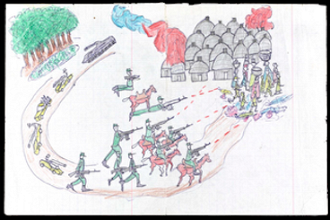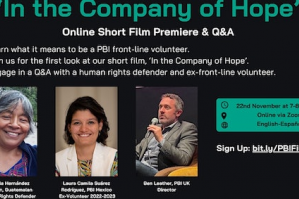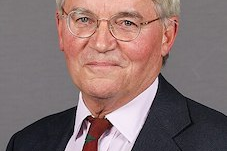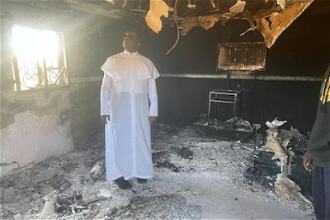Book: Faith, Magic and Corruption - 'This Present Darkness: a history of Nigerian organised crime'
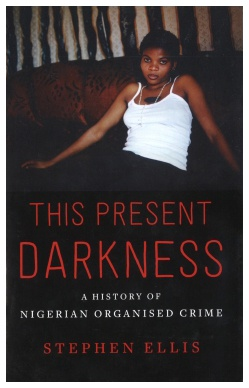
'This Present Darkness: a history of Nigerian organised crime' by Stephen Ellis, Hurst books.
On a visit to see a Christian charity's humanitarian project in Nigeria in 2016, your reviewer was impressed that her jeep was frequently stopped by soldiers and police. Then the pastor at the wheel explained why there were barricades every twenty miles or so. These agents of the state were not keeping an eye out for Boko Haram terrorists or murderous Fulani tribesmen: they were trying to extort money. Similarly, at Abuja airport, the official who pulled me to one side, asking me to clarify my reasons for coming to Nigeria was not fulfilling his job description: he was hoping I would bribe him to get through passport control without delay.
If you have ever wondered why Nigeria produces so many scammers, fraudsters and confidence tricksters, you will find this book illuminating. If you grieve over the astonishing corruption penetrating every level of Nigerian politics, then Stephen Ellis's clearly written study is invaluable. And if you are a person of faith, this is a fascinating account of how superstition is manipulated by "oracles" who profit from the Nigerian trade in sex slaves.
Although some African intellectuals try to blame colonialism for every contemporary problem, there is a tradition of bribery in Nigeria going back centuries. Gifts were given to village rulers in the hopes of establishing mutually beneficial relationships. This system was disrupted in 1914 when the British created an artificial country from hundreds of different tribes, and then divided it into three administrative regions under what was called Indirect Rule. The move transferred immense power to the local Nigerian officials running the three regions. They demanded and received bribes for every service or favour, and their malign influence trickled down to the most lowly school teacher or traffic cop.
Now, the three regions have become 36 states, each offering endless opportunities for graft. At every election cycle, candidates promise they will fight corruption. Yet, many well-intentioned and courageous officials who try to investigate the powerful network of fraudsters finds themselves sidelined or sacked. One such hero, Nuhu Ribadu, the director of the Economic and Financial Crimes Commission, estimated that between independence in 1960 and 2006, $380 billion had been stolen or wasted. He launched investigations into 31 of the 36 state governors. Predictably, foreign companies seeking contracts have been more than willing to offer bribes: and British banks and real estate agents have willingly accepted dirty money stolen from the state.
This pervasive rot is made worse because the administrative systems created by the British have never had local legitimacy. Moreover, deeply held local spiritual beliefs compound the problem: in the non-Muslim areas, people think wealth is connected to mystic powers. Leading politicians and aspiring businesspeople go to the scores of shrines around the country, wearing good luck amulets, and taking oaths before well-remunerated oracles.
Families send their young girls off to be sex slaves in Italy, forcing them to undergo a scarring and torture ritual that convinces the children they will be killed if they resist what is being done to them. The current trade in sex slaves comes directly from Nigeria's long history of pre-colonial slavery, Ellis contends, in which wars were fought specifically to take another tribes' members as slaves. Once on the streets of Italy, it is estimated that the slaves must have sex 5,000 times to pay back the criminal network that owns them. Few girls last more than five years before disease and exhaustion takes its toll.
Even the scammers who churn out '419' emails offering fortunes in exchange for advance fees are credulous in their own way, buying amulets and potions for good luck. Readers of Independent Catholic News might wonder how anyone receiving one of their ungrammatical emails might be conned, but thousands of greedy Westerners are enticed each year, handing over millions of dollars, pounds and euros.
In 2002, Dutch officials conducted a brief experiment at Schipol airport, searching each Nigerian arriving. They found that 63 out of 83 were drug mules. A Nigerian apprehended for bringing drugs into Bangkok told the police, "You can't arrest me because you can't see me. I'm invisible." Such is the power of magic, even among the educated elite, argues Ellis. Many evangelical churches exploit this assumption that belief will lead to wealth through their prosperity ministries. Yet, an Anglican priest living in the Middle Belt, an area plagued by Islamist terrorists, told your reviewer, "There isn't much interest in the Pentecostalists in Jos. People here are more concerned with staying alive, rather than becoming wealthy."



